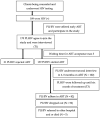Why Counseling Intervention Fails to Improve Compliance towards Antiretroviral Therapy: Findings from a Mixed-Methods Study among People Living with HIV in Bali Province, Indonesia
- PMID: 33562888
- PMCID: PMC7930988
- DOI: 10.3390/idr13010015
Why Counseling Intervention Fails to Improve Compliance towards Antiretroviral Therapy: Findings from a Mixed-Methods Study among People Living with HIV in Bali Province, Indonesia
Abstract
This study explores the contribution of counseling to improving acceptance of and adherence to anti-retroviral therapy (ART) among people living with HIV (PLHIV) and identifies key issues associated with its implementation. We conducted a longitudinal mixed-methods study in Bali Province between 2015 and 2017. The study participants were 170 newly diagnosed PLHIV and 17 outreach-counselor workers (OWs). We interviewed PLHIV for their experiences in receiving counseling, and acceptance of and adherence to ART. We surveyed four counseling domains (privacy, contents, frequency, and duration) and explored the key findings through in-depth interviews. In addition, 24 exit interviews and record reviews were performed. Quantitative data were analyzed descriptively, and qualitative data were analyzed thematically. Out of 170 PLHIV who received the counseling program, 139 (81.76%) accepted ART, and 52 (37.4%) discontinued ART in six months of follow up. Although counselors covered most of the content (16/17 components), the median time and frequency of counseling were insufficient. Despite a high score of HIV counseling provided to PLHIV in our study location, the overall acceptance of and adherence to ART remains fair or moderate. Our study suggests that counseling before ART initiation is inadequate for improving acceptance and adherence to ART in Bali Province. This reduced effectiveness is influenced by internal issues (interpersonal skills, limited technical capacity) and external factors both from PLHIV and society (stigma, disclosure, discrimination).
Keywords: HIV/AIDS; acceptance; adherence; counseling; mixed-methods.
Conflict of interest statement
The authors declare no conflict of interest.
References
-
- Indonesian Ministry of Health Laporan perkembangan HIV AIDS & penyakit infeksi menular seksual (PIMS) triwulan II tahun 2020. In Report of HIV AIDS and Sexually Transmitted Infection Trimester II Year 2020); Jakarta, Indonesia. [(accessed on 10 November 2020)];2020 Available online: https://siha.kemkes.go.id/portal/files_upload/Cover_TW_II_2020_FINAL_OK_....
-
- Indonesian Ministry of Health . Estimates and Projection of HIV AIDS in Indonesia. Dipublikasikan Pada; Sabtu, Indonesia: 2016.
-
- Indonesian Ministry of Health . Estimates and Projection of HIV/AIDS in Indonesia 2019–2024. Jakarta, Dipublikasikan Pada; Sabtu, Indonesia: 2020.
-
- Joint United Nations Programme on HIV/AIDS UNAIDS Data 2017. UN Joint Programme on HIV/AIDS (UNAIDS); Geneva, Switzerland: 2017.
-
- Montaner J.S.G., Lima V.D., Harrigan P.R., Lourenço L., Yip B., Nosyk B., Wood E., Kerr T., Shannon K., Moore D., et al. Expansion of HAART coverage is associated with sustained decreases in HIV/AIDS morbidity, mortality and HIV transmission: The “HIV treatment as prevention” sxperience in a Canadian setting. PLoS ONE. 2014;9:e87872. doi: 10.1371/journal.pone.0087872. - DOI - PMC - PubMed
LinkOut - more resources
Full Text Sources
Other Literature Sources


